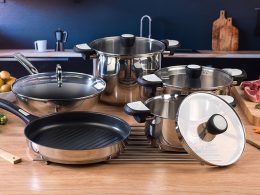Introduction:
The kitchen is the heart of every home, where delicious meals and cherished memories are crafted. However, it’s also a breeding ground for bacteria and pathogens that can pose serious health risks. But here’s the catch: the very products we use to combat these dangers might be causing a new problem altogether. In the pursuit of a spotless kitchen, we often turn to disinfecting wipes as our trusted allies. These handy wipes promise to rid our countertops, appliances, and utensils of germs with ease, making our cooking and dining experience seemingly worry-free. with her expertise in environmental health, warns us to think twice before we reach for that next wipe. She delves into the science behind these wipes, their components, and their potential drawbacks.

Disinfecting Wipes
On the surface, disinfecting wipes seem like a godsend. They provide instant gratification, removing visible dirt and grime. However, when we dig deeper, we discover a less rosy picture. Disinfecting wipes contain chemicals designed to kill bacteria and pathogens on contact. These chemicals are effective at their job, no doubt. But here’s the issue they don’t discriminate between harmful and beneficial microorganisms. When we use these wipes indiscriminately, we disrupt the delicate balance of our kitchen’s microbiome. This disruption can lead to unforeseen consequences. It may result in increased antibiotic resistance among the bacteria, making it more difficult to combat infections. Furthermore, these harsh chemicals may pose health risks when they come into contact with our skin or food surfaces. The “clean” kitchen we envisioned may not be as safe as we thought.
The Invisible Threat
One of the most pressing global health concerns is antibiotic resistance. The misuse and overuse of antibiotics in various forms, including disinfectants, have led to the emergence of drug-resistant bacteria. This poses a significant risk to human health as common infections become increasingly difficult to treat. The misuse of disinfecting wipes contributes to this problem. These wipes often contain antibacterial agents, and when used frequently and unnecessarily, they create an environment where bacteria have a greater chance of developing resistance. just about kitchen hygiene, Dr. Martinez urges us to be cautious about how we use these products. She suggests that we reserve their use for specific situations where bacterial contamination is a real concern, such as when handling raw meat or dealing with known pathogens. For everyday cleaning, milder, eco-friendly solutions can be just as effective without the potential drawbacks.
Advanced Kitchen Hygiene Techniques
These techniques not only ensure a pristine kitchen environment but also safeguard your loved ones from harmful pathogens.
- Handwashing: While it might seem like a basic step, proper handwashing is a cornerstone of kitchen hygiene. Make sure to wash your hands thoroughly with soap and warm water for at least 20 seconds before handling food. This simple act can prevent the transfer of harmful microorganisms.
- Surface Sanitization: Instead of using disinfecting wipes, consider eco-friendly surface sanitizers or a mixture of vinegar and water. These options effectively eliminate germs without the harsh chemical residues.
- Proper Food Handling: Be vigilant when it comes to food handling. Keep raw and cooked foods separate and ensure that meat is cooked to the appropriate temperature to kill harmful bacteria.
- Frequent Refrigerator Cleaning: Regularly clean and sanitize your refrigerator, as it can be a breeding ground for bacteria if not properly maintained.

KeyPoint:
| Features | Disinfecting Wipes | Advanced Techniques |
|---|---|---|
| Effectiveness | Instant results | Long-term hygiene |
| Environmental | Harsh chemicals | Eco-friendly |
| Antibiotic Risk | Potentially High | Minimal |
| Expert Approval | Limited | Highly recommended |
Conclusion:
Kitchen hygiene is a critical aspect of a healthy lifestyle. But as we’ve learned, not all solutions are created equal. In your quest for a spotless kitchen, make informed choices that align with long-term health and safety. Martinez has provided invaluable insights into the world of kitchen hygiene. Whether you’re a seasoned enthusiast or just beginning your journey toward a cleaner kitchen, this article will equip you with advanced knowledge and the tools to make informed decisions. kitchen is your laboratory, and you, the scientist, create gastronomic masterpieces. But behind the scenes, it’s also a battleground where invisible microorganisms wage war. The battle between hygiene and contamination is fought daily on your countertops, in your fridge, and on your utensils. This is where kitchen hygiene steps into the spotlight, and with it, the often-beloved, sometimes-misused disinfecting wipes. As Dr. Olivia Martinez, our expert in Environmental Health,












